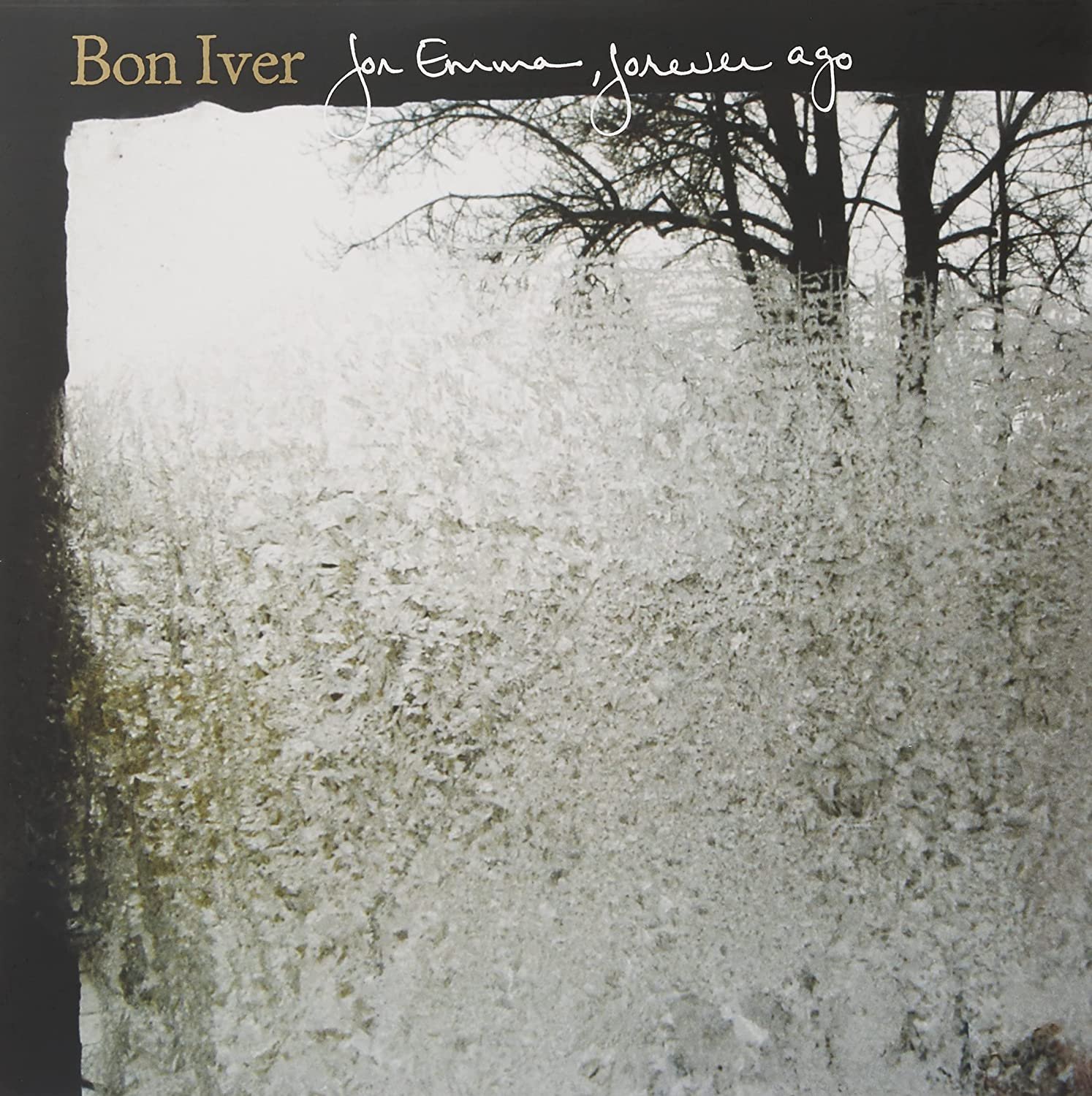Justin Vernon aka Bon Iver is one of the artists who are responsible for a very specific brand of folk music that’s been going on ever since the early-to-mid 2010s, maybe even the key artist in its inception. Lush, well-orchestrated, and vaguely ambient in nature, this style has become one of my personal favorite sounds, and is beloved by many people across the globe to this day. 2007’s For Emma, Forever Ago is where it all started, so you can’t give that album enough credit for its (belated) 15th anniversary.
Gary McDermott
A Scene In Retrospect is probably my favourite of the Everything Is Noise features (followed closely by Inter Claus) to both read and write. It has a strange ability to transport me to a different time and each and every time re-introduces a once-loved album back into my ears. For Emma, Forever Ago is one such album, particularly so as I have fallen out of love with Bon Iver over the years. Before sitting down to write this piece, I can’t tell you the last time I listened to the debut album but I was quickly reminded that I should revisit it more often. I think by this stage most people know the backstory to the album’s recording, with Justin Vernon finding some inspiration in isolation (I’m sure one of my EIN pals might spend a little more time on that), so instead, please indulge me in sharing some thoughts on the tracks that meant quite a bit to me at the time.
“Flume” is Bon Iver, and in particular Justin Vernon, at his finest. The simple strummed acoustic, layered falsetto vocals, and an electric guitar – assumedly played with an e-bow – is as stripped-back as you can get (even if it is one of the few tracks to have additional instrumentation added at a later date, in this case the drums). Listening to “Flume”, having spent a little more time with the likes of the highly altered vocals of 22, A Million, just makes me yearn for Vernon to return to the raw production that made For Emma, Forever Ago so special. Heading straight into “Lump Sum” from here, that thought is solidified. There’s more to this album than just the songwriting; it brings with it a certain feeling of comfort and homeliness and that is reflected in the sound here, the recording making it feel like you are sitting right there in the cabin with Vernon.
“Skinny Love” feels like the song that introduced most to Bon Iver, though the snob in me always ignores the song, probably due to its popularity. Writing this made me listen again, and it is clear to see why it is so loved. Another fine example of the less-is-more approach providing more layers than you might anticipate, “Skinny Love” shows Vernon at his most fragile. Each vocal layer is full of emotion, and you begin to get a sense of the feeling of hopelessness that preceded that famous trip to the cabin in the woods. “The Wolves (Act I and II)” was without doubt my favourite track on the album back when I first heard it (I vividly remember watching the Blogothèque version countless times after coming in from college nights out), and it remains a beautiful piece of work. It is arguably the best example on the album of Vernon’s attempt to layer his vocals to sound like a choir – you would find it hard to convince someone hearing it for the first time that it is just one vocalist.
“Blindsided” is an interesting one for me, in that it didn’t resonate with me for quite a while, in fact being a song that I would often skip. I remember listening to a friend on college radio in Edinburgh when writing an assignment (last minute, as always) late one evening and texted him asking him to play some Bon Iver. He fulfilled my request, but I was a little disappointed when he introduced “Blindsided”. However, on that listen something just clicked. It felt like the first time I properly listened to the song, and the lyrics just spoke to a late teen that felt there was a bit more to life than excessive student drinking: ‘Peek in, into the peer in/I’m not really like this, I’m probably plightless’.
Listening to “For Emma” in retrospect is another interesting one; it gives a little insight into what Vernon envisaged Bon Iver would become in the years that followed, with it being the other track with instruments added later, this time with brass. Sonically it’s a different beast to the rest of the album, the brass immediately giving the piece a different feel (even though the mix remains organic enough so that it still fits in with the rest of the album). There’s even a little bit of dirt on the electric guitar sitting underneath here, to really push things forward. The noise that ends “For Emma” sets up the closing track perfectly, the stunning “re:stacks” – six minutes that give as close an insight into the mind of Vernon that you are likely to find with an introspective look at the gambling and drinking that left Vernon feeling the need to escape. I managed to catch Bon Iver live quite a few times, each time the stage show becoming a little more extravagant than the last – but the highlight from those shows remains a stripped back version of this track with The Staves, which thankfully has been immortalised on YouTube. If you love this album and haven’t seen this version, check it out immediately.
Part of me would love to see how 2022’s Bon Iver would approach For Emma, Forever Ago with the endless stream of resources and collaborators that the project now has. You can bet the little amounts of autotune that were used would increase at least ten fold, synths would cover each track and we would see the likes of Taylor Swift find their way onto a track or two. It might be great – in fact it would probably be a much bigger success commercially than the original album was. What is certain though is that it is the lack of budget, equipment and even care about how the album would sound (as Vernon planned to record it ‘properly’ if picked up by a label) is what made For Emma, Forever Ago as charming and as timeless as it is.
Landon Turlock
As a debut record, For Emma, Forever Ago is a natural microcosm of so much of the music Bon Iver (aka Justin Vernon) has since gone on to make, but also the start of a throughline in indie folk and popular music that continues on today.
For the slightly less nerdy among us, For Emma, Forever Ago was mainly written and recorded in a Wisconsin hunting cabin after Vernon was kicked out of a band and was recovering from some health issues. While a history lesson is not in order, the environment in which Vernon created the album is palpable in the music itself. Not unlike another seminal folk album, Bruce Springsteen’s Nebraska, the independent, isolated nature that led to the creation of this album pours into its sound – a contrast between simple, raw production and the introduction of an experimental approach Vernon has continued to hone over the past 15 years.
I connect with that juxtaposition of concision and creativity on Bon Iver’s debut in an intimate way, and I think it’s hard not to. The staying power of “Flume”, “Skinny Love”, or “Re: Stacks” is more than established in the critical reception and ongoing popularity of the tracks fifteen years later. The singable melodies, surreal yet sincere lyricism, vocal stacking, and sparse instrumentation are akin to a limited paint palette used to create dynamic, surprising self-portrait. Even when Vernon leans into more familiar and fleshed-out folk influences, like on “For Emma”, the album’s sound is genuine and ambitious.
While a raw and, at times, unpolished album, For Emma, Forever Ago is undoubtedly influential. Bon Iver’s appearances alongside a pop icon like Taylor Swift are just as symbolic of this fact as the ways I hear his impact on artists as diverse as Drewsif, Sleep Token, and Novo Amor.
Daniel Reiser
Shout out to our modern day Thoreau.
Justin Vernon is in a class of his own. It’d be difficult to find someone who went from recording a debut LP in isolation in the Wisconsin woods to being featured on one of the biggest rap records with one of the wildest artists this century has seen to date.
For Emma, Forever Ago is an incredibly sad record and amazingly raw experience. I remember hearing it for the first time and acknowledging the raw tangibility of the entire presentation. Vernon is masterful in emoting, and from “Flume” to “Re: Stacks”, he proves that 9 times in a row.
This album isn’t completely sad, either. The flickers of hope jut through on tracks like “Lump Sum” and “Skinny Love”, even with how downtrodden they are overall. Those complexities further solidify its classification as a masterpiece. It’s a beautiful and very clear display of the human condition that reflects upon the experience of love, loss, reflection, and rebirth/reincarnation.
In its entirety, this album carries a very strong resemblance to Elliot Smith. The sadness is palatable, and the instrumentation is whimsical. The bedroom production quality intensifies its authenticity, and Vernon decently directs the listener to feel what he’s feeling, even if he sounds that lonely. It’s rather breathtaking.
The centerpieces of this album reflect the institutional nature of seclusion perfectly. “The Wolves (Act I and II)” sounds like it starts off the rails, and we’re heading towards a complete dismantling of any musical cohesion, only to turn around to get on the right track and pick up steam. In the end it becomes the musical equivalent of a steam train running full speed ahead. It’s beautiful, sad, endearing, and relatable.
“Blindsided” is earnest and endearing with a deep tangibility that instantly transports the listener to a choir fireside, except every singer is Justin Vernon in various states of contemplation and emotion. Its spectral desperation exudes a definable sincerity that establishes a whole picture of the multiple emotions and feelings oneself has in a failing relationship.
The last track I want to highlight is “For Emma”. With its introduction much indebted to “Fade Into You”, Vernon channels that alternative dark country sadness, melds it with his own tinged folksy sadboy energy, and throws in some Sufjan Stevens horns to boot. It’s an amazing track that lingers with you for a long time. The sparsity and minimalist production emphasizes space; maybe between people, between emotions, between thoughts? Who knows, exactly, and I’m okay with not knowing, just to experience the beauty of it all.
Much unlike my #1 sad singer, Elliot, Vernon moved outside of the isolation and depression that helped define this album’s sound. And in moving past that, Vernon went on to shapeshift in comparable style to Stevens, and provide us with an amazingly complex gem of a follow-up (and arguably one of the most important records of that decade) with Bon Iver. That record’s complexities, and Bon Iver‘s artistic output are all foreshadowed with this debut. Sadness as beautiful art is pretty astounding stuff. I hope Emma is ok.






